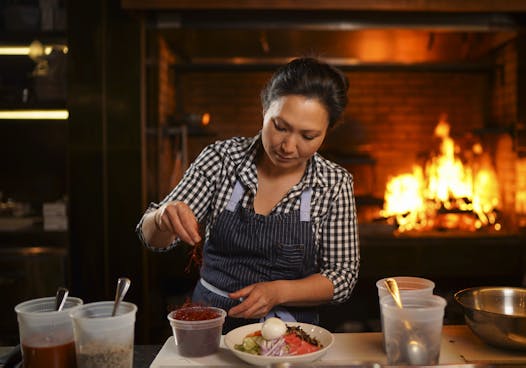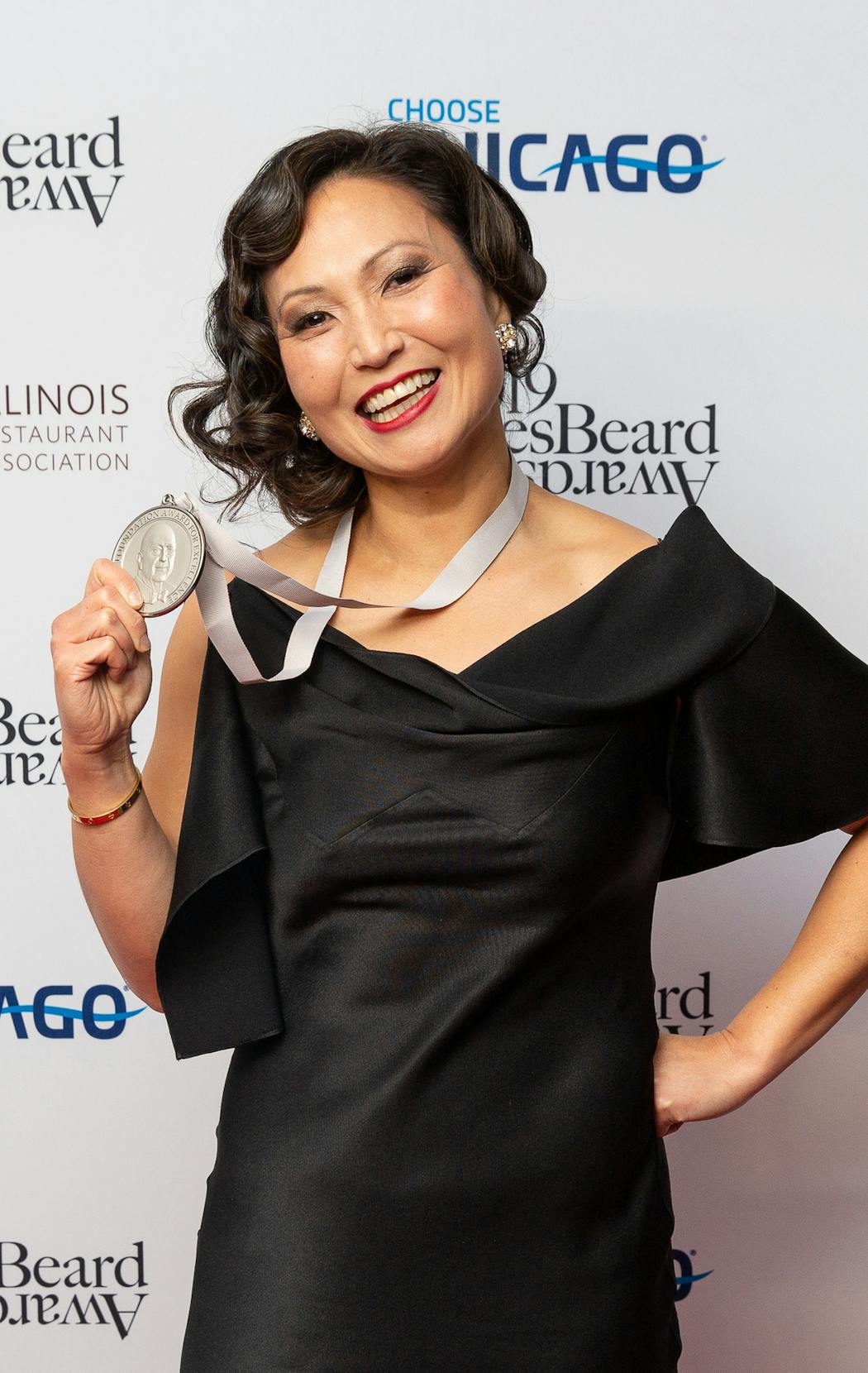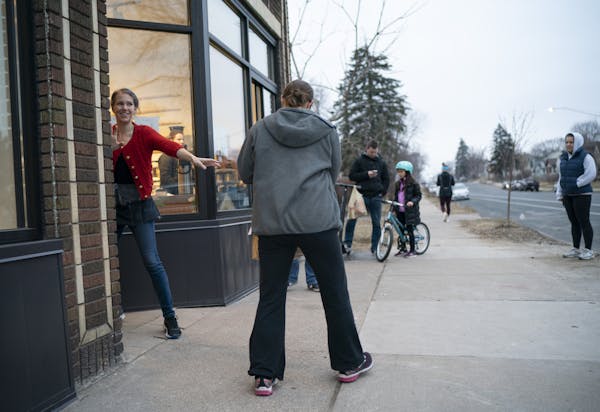Editor's note: This story from the quarterly Star Tribune Magazine was printed before the coronavirus pandemic reached Minnesota. Before visiting places mentioned, please check to make sure they are open, and be aware that other details may have changed.
Was it the tweet from the Korean embassy that convinced Ann Kim's parents she was on the right track as a chef? Or the Wüsthof knife ads with her image highlighting the cutting edge? Maybe it was her brief tenure along 2nd Avenue in Minneapolis last summer as co-grand marshal of the Aquatennial Torchlight Parade. It definitely was not the James Beard award for Best Chef Midwest in 2019.
"Who is James Beard?" her parents asked, before reminding her to be humble and to make sure the restaurant bathrooms were clean. Such is the life of any child — no matter her age — who veers from parents' expectations. But Kim's immigration story made it more difficult to strike out on her own. These days, Kim, 47, juggles the roles of co-owner, with husband Conrad Leifur, and chef of three local restaurants (Pizzeria Lola, Hello Pizza and Young Joni). A dynamic and famously outspoken force in the Twin Cities restaurant community and beyond, she's turned her focus to a fourth restaurant, Sooki & Mimi, which opens in Minneapolis this summer and takes its culinary cues from Mexico, by way of Korea.
That's where Kim's story begins, in South Korea, her birthplace and home until she immigrated to the United States in 1977 as a 4-year-old. She and her parents, sister and maternal grandmother landed in Apple Valley, sponsored by her Minnesota-born uncle. With Korean ingredients difficult or impossible to find, Kim's mother and grandmother made their own gochujang (chile bean paste) and kimchi (a spicy concoction of fermented vegetables) and other traditional standards, the start of many food memories for Kim.
"We would eat a bucket of KFC with kimchi," she says.
An actor even in high school, Kim graduated from Columbia University in New York City with a degree in English and a passion for theater. After moving back to Minnesota, she spent eight years performing on stages throughout the Twin Cities.
Tired of the hustle of looking for acting jobs, she and then-boyfriend Leifur flirted with the idea of opening a Jimmy John's franchise before deciding they wanted control over their business and creative decisions. Without a formal culinary background — not even work in restaurants — Kim focused on pizza, perfecting the skills to make it a showcase.
Her strategy paid off. Even before the Beard award, she attracted national attention, with Young Joni landing on "Best Restaurant" lists around the country; it was the Star Tribune's 2017 Restaurant of the Year. Among the unusual opportunities that fell into her lap was a series of Wüsthof knife ads (find it at wusthof.com/defining-the-edge/chef-ann-kim) that focused on up-and-coming chefs.
"I knew I really made it when the ad showed up on a digital billboard in Times Square," Kim says. "So I did make it to Broadway, but in a different way."
None of this was what her parents planned for her — not "struggling actor" or "struggling cook."
"For my parents, it was doubly hard because they gave up everything to come here. My mother had two daughters and she saw that we would have opportunity as women here. We could put our heads to whatever we wanted to accomplish. I feel like I have done that. It just wasn't the road or the journey that they thought," Kim says. "It wasn't easy, but it turned out well. Over time they realized that I was happy, and I think they are proud."
Nine years after she opened her first restaurant, Kim was back on the stage, this time to accept the Beard award.
"My journey has not been easy. It has not been linear and it has not been traditional," she told the black-tie audience.
"By saying 'no' to fear, I said 'yes' to possibility. We cannot be what we cannot see."
Kim's success has provided a platform to serve as a role model, both inside and out of the culinary arena. It comes not only in the form of encouragement to colleagues, but also as the face of success to young women and Asian students who hear her speak at keynote addresses.
"They say 'I never thought I could see myself in this way until I saw you.' That makes me feel great because I wish I had someone like that to look up to when I was growing up."
This interview has been edited for length and clarity.
Many diners think a chef cooks dinner and then goes home. What's it really like?
To me, chef means leader, ultimately. A lot of people have this misconception that I get up and I'm cooking at all the restaurants and that's my job. I mean, yes, when we opened Lola, I'd get up, make the dough, set up the line, work the line, clean up and then do it all over again. That was very much my first endeavor. Now I have three, going on four, restaurants and there's no way I can be at all places at once.
When I decided we were going to grow, I had to change my job description, my responsibilities and priorities. I've got a team of empowered chefs and managers and the entire team helped create the culture based on the foundation we set and the values that we set forth. I have the title of chef, but I also have the title of owner and my husband and I, Conrad, are the only two investors in this. We have over 180 employees and we'll probably add 80 more. That's a lot of responsibility.
With the new restaurant, Sooki & Mimi, and also with your first, Pizzeria Lola, you've embraced the challenge of taking on a cuisine that's new to you as a chef. Do you thrive on challenges?
I think it's part of my DNA, though if you look at my history growing up you would think I would be programmed not to take many risks. I get bored easily. I've always liked the act of creation, and I think my purpose is to create places that are joyful and that bring joy to people, and also to create beauty because I love beauty, whether it's art or nature or design or food. A restaurant is a perfect place to present all those things, because today it's not about going out to eat for sustenance. It's about the experience. I want to make sure that, if people are going to pay their hard-earned dollars and choose to eat at one of my establishments, that I create an experience for them.
Do you feel like your theater experience has helped you in the restaurant industry?
There are so many comparisons. It wasn't like I thought I was an actor so I should become a chef. But it comes naturally easier for me, at least the lifestyle, because I was an actor. I think if I was coming from 9 to 5, with benefits and paid time off, it would have been more of a shock to my system. But I was hustling as an actor, living from check to check. Every show, I had a different audience. I was working with a different team. You had to think on your feet if someone forgot their lines or was sick. The show went on. The dishwasher doesn't show up, it doesn't matter. The restaurant doesn't close. You are working hours that most people are off; you're working holidays.
Tell us more about the similarities.
There is a sense of leaving one stage for another because you are performing. Every night you have a different set of guests and they are your critics. Some are going to love it and some aren't. What I loved about the theater and what I love about what I'm doing now is storytelling. Now I get to tell stories through food.
Young Joni is a big example of sharing my palate and being an immigrant and growing up in Minnesota and the flavors that I love. It's about people saying, 'When I eat your food, it makes me feel good. I celebrate here.' 'When I have a bad day I can rely on you.' If my food can make you happy or joyous or moves you to tears, it's kind of the same rush you had on stage to move people to think or laugh or cry.
You landed on family names for your restaurants (see box at right). Clearly you are honoring your family, but explain the significance.
Naming is hard. I don't have kids of my own and I can't imagine how hard it is to name your children. But in some ways it feels like that. The name is representative of the first experience of what the restaurant will be. I wanted it to be personal, because all my restaurants are very personal to me and the food was a part of my upbringing. When I think of the fondest food memories I have, it always involves my family in some way.
The names honor where my inspiration came from. It didn't come from the traditional culinary education, but it did come from an education of maternal figures, women figures, strong figures that influenced me. I wanted to pay homage to that.
Regarding another family member, your husband has a lower social profile. What influence does he have on the restaurants?
We've been together over 14 years, and met on match.com. Conrad is a very important part of the business. I'm the face. People identify the restaurants with me. However, without him, the restaurants wouldn't exist. People ask what's the most important advice for someone who is about to embark on this. And I always say, 'Find a partner you can trust.'
As you grow, find multiple partners and a team that you can trust, because it's not for the faint of heart and it's not something you do on your own. Look for someone who has skills that are different from your own. Conrad started out as the financial person behind the restaurants, but as we've grown and evolved, he's become a big part of the cultural component. He's just very shy. I'm the extrovert. He's the introvert. I've tried to get him on camera or to do interviews, and he doesn't want any part of it. He says, 'I'm perfectly happy to be in the shadows and you can take all the light.'
Hospitality is such a big part of restaurants. Was that part of your family growing up?
To me, hospitality is making people feel taken care of. It's making people feel safe and welcome. Growing up, we didn't have much money as immigrants. My parents came with nothing. They didn't speak the language. They worked multiple jobs for minimum wage, so we had to scrimp and save. But food was the one place where my mother wanted to make sure we never felt like we didn't have enough. I didn't see my parents a lot — they were working. But when they were in the kitchen, when we were eating together as a family, I felt safe. I felt happy. I also felt that it was when my mother was happiest. To me, that's the kind of sensibility that I want to extend to my guests. It comes from a really personal place. It's like a warm hug.
You've mentioned that you want your dishes in the restaurant to tell your stories. What stories do you want to convey?
Growing up was hard because, as a kid, all you want to do is assimilate, to fit in and belong. You definitely don't want to stick out in a crowd. And I did, being Korean and growing up in Apple Valley at the time, where there was very little diversity. I think I was the only Asian kid in my school. Early on, my grandmother used to make my lunches and I was sent to school with a bento box of rice, dried fish and kimchi, and I was ostracized. I just wanted a bologna sandwich and to fit in at school.
And now we've come full circle, haven't we? Now it's like diversity and flavor and cultures, we're embracing that, right? It's wonderful to see that all the things I grew up with, that I took for granted or felt embarrassed or ashamed about, is something that I'm really proud of now. I feel like I'm bringing that forward.
Do you need to be fearless to be a chef or restaurateur?
I'm not fearless. That's not even close to the truth because I have fear every day. It's not so much about being fearless as about recognizing your fear and how you manage that. I try not to let fear control me or rule my decisionmaking. I think a lot of people make decisions rooted in fear, and those are reactionary and are the wrong choices. If you are scared, ask yourself why, ask yourself many different questions and then make the most informed decision you can.

The 5 best things our food writers ate this week

A Minnesota field guide to snow shovels: Which one's best?

Summer Camp Guide: Find your best ones here

Lowertown St. Paul losing another restaurant as Dark Horse announces closing




